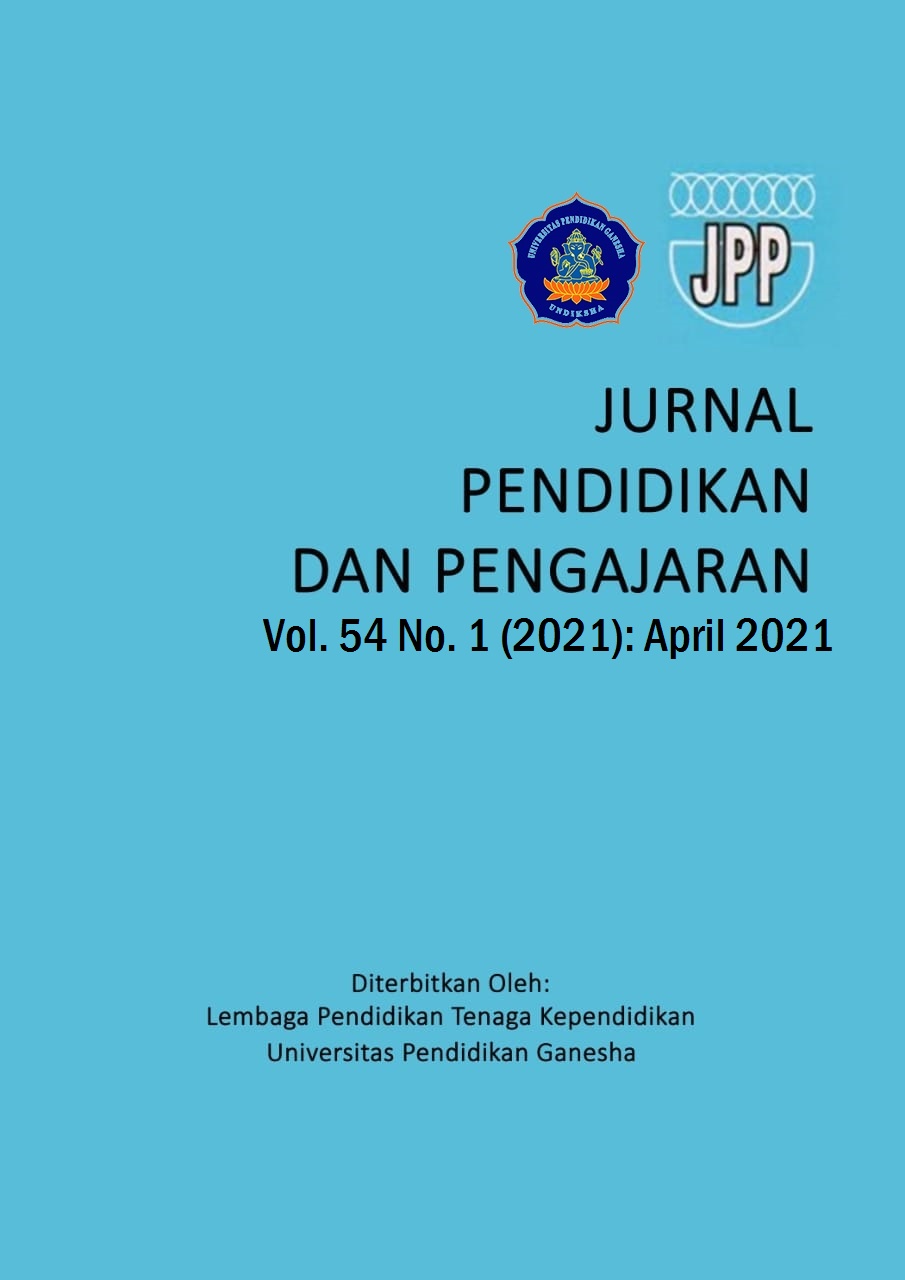The Need Analysis of Student Worksheet for Writing Drama Script of Seventh Grade Student
DOI:
https://doi.org/10.23887/jpp.v54i1.33230Keywords:
Need Analysis, Script WritingAbstract
This research aims to describe the results of the learners’ needs toward the drama script writing material development using a scientific approach. This research applied a qualitative approach. The data were collected with observation, questionnaire, and interview techniques. The applied instruments were observation, questionnaire, and interview. The sample consisted of learners. The findings showed that the learners needed communication and technology-based teaching materials to support their needs of drama script writing skill training. Based on the learners’ characteristics identification, they needed learning application to make the learning activities and to freely enrich the sources. They also needed interesting teaching materials that had many examples, provided writing exercises, the opportunity to interact, time to work the exercise, and space to perform. Therefore, this research proposed Moodle application as a learning material in the form of a Student Worksheet. This initial stage of research is expected to be the beginning of drama script writing material development with a scientific approach and based on Moodle. The results of the learners’ need analysis could be also used by other researchers to obtain the 21st-century learners’ characteristics.
References
Ade, I. N. (2014). Jenis-jenis bahan ajar dan pemilihan bahan ajar. Riau: Pasir Pangaraian.
Admadja, I. P., & Marpanaji, E. (2016). Developing Learning Multimedia of Individual Practice in Fundamental Music Instrument for Smk Students in the Expertise of Karawitan. Jurnal Pendidikan Vokasi, 6(2), 173–183.
Aji, Y. N. W., Suwignyo, H., & Maryaeni. (2017). Pengembangan Bahan Ajar Memerankan Drama Berbasis Legenda Untuk Kelas Vii. Jurnal Pendidikan: Teori, Penelitian, Dan Pengembangan, 2(9), 1168–1174. http://journal.um.ac.id/index.php/jptpp/article/view/9926/4692
Amiroh. (2012). Membangun E-learning Dengan Learning Management System Moodle. Sidoarjo: PT Berkah Mandiri Global Indo.
Arsanti, Meilan. 2018. Pengembangan Bahan Ajar Mata Kuliah Penulisan Kreatif Bermuatan Nilai-Nilai Pendidikan Karakter Religius Bagi Mahasiswa Prodi PBSI, FKIP, UNISULA Vol. 1, No.2. http:// jurnal.umk.ac.id
Batubara, Hamda. (2018). Pembelajaran Berbasis Web dengan Moodle. Yogyakarta: Depublish.
Daryanto. (2014). Pendekatan Pembelajaran Saintifik Kurikulum 2013. Yogyakarta: Gava Media
Depdiknas. (2008). Panduan Pengembangan Bahan Ajar. Jakarta: Depdiknas, Dirjen Manajemen Pendidikan Dasar dan Menengah, Direktorat Pembinaan SMA.
Endraswara, S. (2011). Metode pembelajaran drama (apresiasi, ekspresi dan pengkajian). Yogyakarta: CAPS.
Fadlillah. (2014). Implementasi Kurikulum 2013 dalam pembelajaran SD/MI, SMP/Mts, SMA/MA. Yogyakarta: AR-RUZZ MEDIA.
Harahap, (2015). Pemanfaatan E-Learning Berbasis LCMS Moodle Sebagaino. Media Pembelajaran Untuk Mata Kuliah Sistem Informasi Akuntasi Vl. 15 No. 1. http://www.core.ac.uk
Hernawan, Permasih, & Dewi. (2017). Pengembangan Bahan Ajar. (pp. 1-13). Direktorat Jenderal Pendidikan Tinggi.
Hasan, Mukhidin, Kusumam. (2016). Pengembangan Bahan Ajar Mata Pelajaran Dasar dan Pengukuran Listrik untuk Sekolah Menengah Kejuruan. Jurnal Pendidikan Teknologi dan Kejuruan , Vol. 23 No. 1. Http:// Journal. uny. ac. id
Jabrohim, dkk. 2001. Cara Menulis Kreatif. Yogyakarta: Pustaka Pelajar.
Jauhari, H. 2013. Terampil Mengarang. Bandung: Nuansa Cendika
Khaerudin, D., Kusmana, S., & Khaerudin, I. R. (2019). Pengembangan Bahan Ajar Menulis Drama Berdasarkan Pengalaman Pengarang Sebagai Bahan Ajar Drama Di Smp / Mts. Jurnal Tuturan, 8(2), 86–95.
Muqodas, Sumardi, & Berman. (2015) Desain dan pembuatan bahan ajar berdasarkan pendekatan saintifik pada mata pelajaran sistem dan instalasi refrigerasi Vol 2 (1).http://ejournal.upi.edu/index.php/jptpp/
Mulyati, Yeti, dkk. 2007. Pendidikan Bahasa dan Sastra Indonesia di Kelas Tinggi. Jakarta: Universitas Terbuka
Murti, S., & Muhtadin. (2019). Pengembangan LKS Menulis Naskah Drama Siswa Kelas VIII SMP se-Kecamatan Tugumulyo keaktifan siswa sehingga kurang dapat mengembangkan gagasan atau idenya dalam. Prosiding Seminar Nasional Bulan Bahasa (Semiba), 256–264. https://ejournal.unib.ac.id/index.php/semiba
Rahman, (2017). Peningkatan Kemampuan Menulis Naskah Drama dengan Pendekatan Contextual Teaching Learning (CTL). Jurnal Ilmiah Pend. Bahasa, Sastra Indonesia dan Daerah. Vol. 7, No. 1
Suryana, A. (2017). Pengembangan media audio visual menulis teks hasil observasi siswa kelas vii smp n 1 indralaya. Jurnal Pendidikan Bahasa Dan Sastra Indonesia Universitas Sriwijaya, 1–31.
Suryani, I., & Rasdawita. (2018). Pengembangan Bahan Ajar Menulis Naskah Drama Berbasis Pendekatan Kontekstual di FKIP Universitas Jambi PENDAHULUAN Peraturan Rektor Universitas Jambi Nomor 02 tahun 2017 , dosen sebagai ilmuan memiliki tugas mengembangkan suatu cabang ilmu pengetahuan dan. Pena, Jurnal Pendidikn Bahasa Dan Sastra, 8(1), 80–92.
Sutanta, Edhy. 2010. Konsep dan Implementasi E-Learning. Yogyakarta: IST Akprind, Jurusan Teknik Informatika, Fakultas TI
Yogiyatno, W., & Sofyan, H. (2013). Pengembangan multimedia interaktif kompetensi dasar mengoperasikan software basis data untuk SMK Negeri 1 Seyegan. Jurnal Pendidikan Vokasi, 3(3), 391–404. https://doi.org/10.21831/jpv.v3i3.1851
Syabani, P., Darmawati, & Febrita, E. (2018). Development Of Students Worksheet Based On Contracttivism Approach To Material Changes and Conservation Of Living Environment For Learning Biology Tenth Grade Senior High School. Jurnal Online Mahasiswa
Tri Mulyani, K. C. (2015). Implementasi Pendekatan Scientific Dengan Model Pembelajaran Berbasis Masalah (Problem Based Learning) Dalam Peningkatkan Pembelajaran IPA Pada Siswa Kelas IV SD. Kalam Cendekia, Volume 3, Nomor 1.1, 26.
Downloads
Published
How to Cite
Issue
Section
License
Authors who publish with Jurnal Pendidikan dan Pengajaran agree to the following terms:- Authors retain copyright and grant the journal the right of first publication with the work simultaneously licensed under a Creative Commons Attribution License (CC BY-SA 4.0) that allows others to share the work with an acknowledgment of the work's authorship and initial publication in this journal
- Authors are able to enter into separate, additional contractual arrangements for the non-exclusive distribution of the journal's published version of the work (e.g., post it to an institutional repository or publish it in a book), with an acknowledgment of its initial publication in this journal.
- Authors are permitted and encouraged to post their work online (e.g., in institutional repositories or on their website) prior to and during the submission process, as it can lead to productive exchanges, as well as earlier and greater citation of published work. (See The Effect of Open Access)





